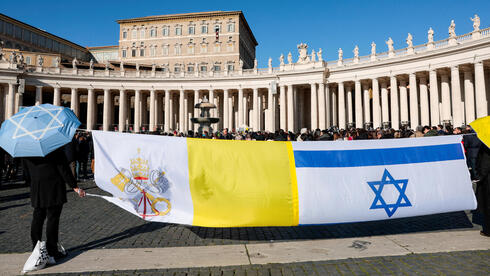The tensions between Israel and the Catholic Church intensified just before the funeral of Pope Francis, after Israel chose not to send a main representative to the event. The dispute follows up on the revelations that the Israeli Foreign Affairs has suppressed its tweet of condolences after the Pope’s death, causing an angry response to the leaders of the Catholic community in Israel.
In a letter sent to Prime Minister Benjamin Netanyahu, Catholic leaders have expressed their “deep concern and frustration” concerning the decision of the Ministry of Foreign Affairs to prevent Israeli ambassadors and the missions of publishing official declarations following the Pope’s death. The letter, sent two days before the funeral, condemned this decision as a “serious insult” to the Christian citizens of Israel in the world.
The leaders also criticized the absence of an official message of Israeli condolences, the appellant “unacceptable” and contradictory with the repeated affirmations of Israel of respect for pluralism and all religious beliefs.
“Avoiding the official expressions of mourning at this time is unacceptable and is in direct contradiction with Israel’s commitment to respect all confessions,” said the letter.
In response to the outcry, Netanyahu’s official account published a brief message of condolences in English: “The State of Israel extends its deepest condolences to the Catholic Church and the world Catholic community of the passage of Pope Francis. May his memory be a blessing. “
However, a senior Catholic figure in Israel described the message as “too little, too late”, noting that it was only published in English and lacked the sorrow of the Christian population of Israel. The figure also expressed its disappointment that only the Israeli ambassador to the Vatican would attend the funeral.
On the other hand, Moshe Katsav, the president of Israel, represented the country at the funeral of Pope John Paul II in 2005.
The tensions intervene in the middle of the criticism of Pope Francis’ position on the military actions of Israel in Gaza, although some Catholic leaders argue that the Pope had been a firm friend of Israel, meeting hostage families and defending their release. They also underlined the Pope’s positive contributions to Israel and the Jewish community.
A source from the Catholic Church in Israel added that the situation reflects a broader feeling of negligence towards the Christian community in Israel, emphasizing insufficient funding for Christian churches and the severe treatment of Christian faithful by Israeli police.
In a statement, the Israeli Foreign Ministry defended its actions, declaring that the country had expressed its sorrow about the Pope’s death and quickly sent condolences. The ministry noted that Israeli ambassadors had signed condolence books opened by the Vatican and published messages on official channels. The Israel ambassador to the Vatican also visited the Pope’s coffin to pay tribute on Wednesday.
Israel will be officially represented at the funeral by his ambassador to the Vatican.


